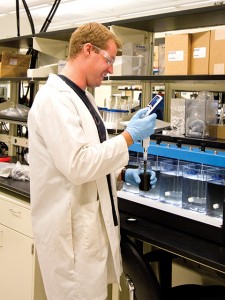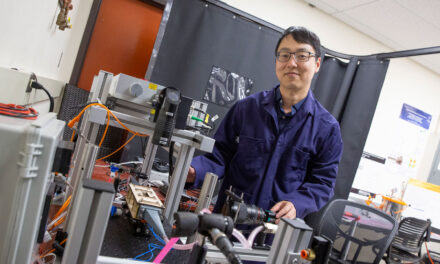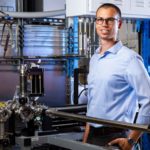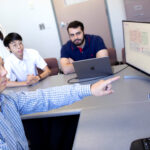
Scholarship, fellowship will propel engineering student’s water research

Arizona State University engineering doctoral student David Hanigan is researching water treatment and safety. Photographer: Jessica Hochreiter/ASU.
Arizona State University doctoral student David Hanigan will be continuing promising research on water treatment and safety with support from two leading organizations of water experts.
Hanigan has been awarded the international Water Environment Federation’s Canham Graduate Studies Scholarship and the American Water Works Association’s Abel Wolman Fellowship.
His research is the focus of efforts to complete the doctoral degree program in environmental engineering in the School of Sustainable Engineering and the Built Environment, one of ASU’s Ira A. Fulton Schools of Engineering.
Hanigan’s academic and research advisor is professor Paul Westerhoff. He has been working with Westerhoff and colleagues on projects aimed at protecting human health from the impacts of potentially harmful chemical substances that are finding their way into drinking water.
Developing more effective treatment methods to remove substances from water supplies that pose health risks is only one goal.
“We also want to find ways to prevent these things from getting into water supplies in the first place,” Hanigan said.
Some of the substances are carcinogens – substances that can cause cancer. Others are carcinogen precursors – substances from which carcinogens can emerge during application of disinfecting chemicals at centralized water treatment plants.
Some are chemical compounds that have been found to occur as the result of reactions between organic matter in water and substances in products used to disinfect water.
A problem arising more recently involves substances in pharmaceuticals and personal care products, which wastewater plants are not able to fully remove. The potential effects of many of the substances remain largely unknown. One adverse affect includes the reaction of these substances with chemical disinfectants to form carcinogens.
“We are loading our wastewater with things we don’t understand a whole lot about.” Hanigan said. “So we have to identify them, and determine if they are precursors to carcinogens or other contaminants that endanger human health. That means in some cases we have to isolate them from tens of thousands of other molecules.”
The scholarship award will provide $25,000 to support Hanigan’s research in this area. The fellowship award will provide $30,000 per year for two years.
Hanigan came to ASU after earning bachelor’s and master’s degrees in civil engineering at the University of Missouri. The decision was largely because of ASU’s increasing leadership in advancing water research, he said.
He credits his success in earning the scholarship and fellowship awards to the expertise he has gained working with Westerhoff and other ASU researchers.
“David is motivated by complex real-world problems emanating from the need to balance the benefits of disinfecting pathogens in drinking water against the unintended consequence of the same chemical disinfectants forming carcinogens in our water,” Westerhoff said. “He has developed a unique strategy that potentially will revolutionize the way the drinking water field characterizes the bad actors responsible for these adverse unintended disinfection by-product formation.”
The research experience under Westerhoff has helped Hanigan crystallize his career aspirations.
As the world’s population grows, providing safer water will become increasingly critical, Hanigan said. And he hopes to “contribute significantly” to finding solutions to the challenge.
Media Contact
Joe Kullman, [email protected]
(480) 965-8122
Ira A. Fulton Schools of Engineering



































